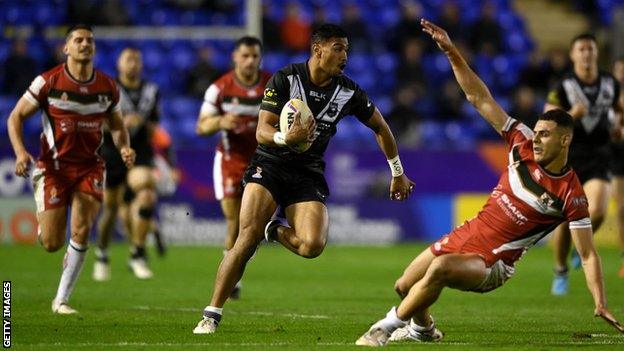Rugby League World Cup organisers defend ticket prices after week one
- Published

A crowd of 5,453 watched the world's number one-ranked team New Zealand open their campaign in Warrington
Rugby League World Cup chief executive Jon Dutton has defended the tournament's ticket pricing policy and says it is struggling to break even.
The ticket pricing structure has been criticised after some poor attendances during the first week of the tournament, being hosted in England.
Tickets first went on sale in October 2020 but because of the coronavirus pandemic, the tournament was postponed for a year in August 2021.
Prices were best in 2020 and increased slightly in 2021, yet despite the UK now being in the midst of a cost of living crisis, many of those prices have remained.
"We want to make sure that we remain affordable, accessible and agile, and do what we can to continue to learn and implement those changes as we go forward," Dutton told the BBC.
The one-year delay and a subsequent surge in inflation has contributed to a crowd of 5,453 for New Zealand's win over Lebanon in Warrington, while 4,182 attended France's win over Greece in Doncaster.
"It could look better on TV," added Mick Hogan, the tournament's revenue director. "But there are people who paid for category A and B tickets two years ago.
"It wouldn't be fair now for people to come in at £25 or less and sit next to them. We have to honour the support of those people two years ago."
At the start of the tournament, tickets were available at £25 or less for 57 of the 61 games. Lowest category tickets have not sold out at any of the opening eight games.
"We know we won't fill every seat," said Dutton. "But we are relentless and determined to make sure that it's accessible to local people.
"If we had the opportunity to do this all over again, we'd price some things differently. Would we fundamentally change? Absolutely not.
"We're now into the cycle, we have customers who bought tickets two years ago, and we are comparative with Super League."
Superb England start boosts sales
Every game is being broadcast live on the BBC, with a total of 3.8m viewers so far and a peak of 1.8m for England's 60-6 win over Samoa on Saturday - 22% of the audience share.
More tournament tickets were then sold on Saturday night than at any point over the last two years, with more sales coming from a London postcode than any other region.
If England win Group A, their quarter-final would be in Wigan, and if they reach the semi-finals they will play at London's Emirates Stadium, for which more than 35,000 tickets have now been sold.
"We saw in the women's Euros the momentum and interest a good England start generates and the whole nation really gets behind it," said Dutton.
"As we move forward, we know that the England games will start to bounce off each other into sellouts. People are plotting the England path, potentially to Wigan, the Emirates and Old Trafford."
'There isn't a bad seat in the stadium'
England's game with France in Bolton on Saturday is almost sold out, but so far only 6,000 tickets have been sold to see New Zealand, the world's number one-ranked team, face Jamaica in Hull on the same day.
Organisers hope the attendance will pass 10,000 as tickets are still available for adults at £25 and children at £15 for children, although they are in the corners of the stadium.
"People sit in those seats for Hull FC [rugby league] and Hull City [football] games," Hogan added. "There isn't a bad seat in the stadium.
"The tickets in the middle take some shifting. But for everybody that does [buy a ticket there], it gives us the ability to offer more tickets at the cheaper level."
Dutton added that the organisers are trying to make more tickets available for disadvantaged groups.
"If there are people that cannot afford to come and watch these games, we are working with our host towns and cities to make sure they have an ability to do that," he said.